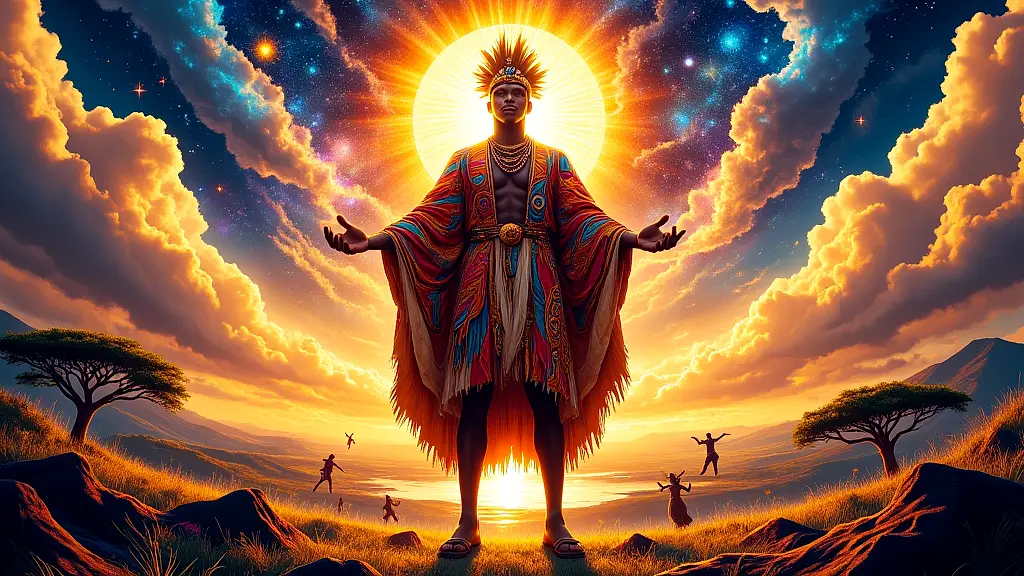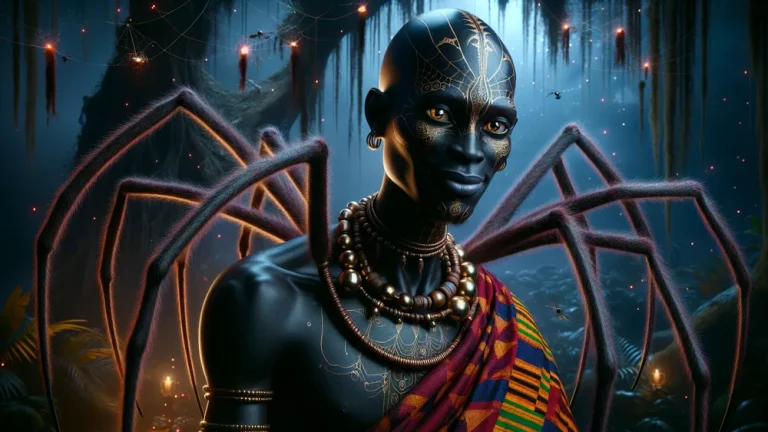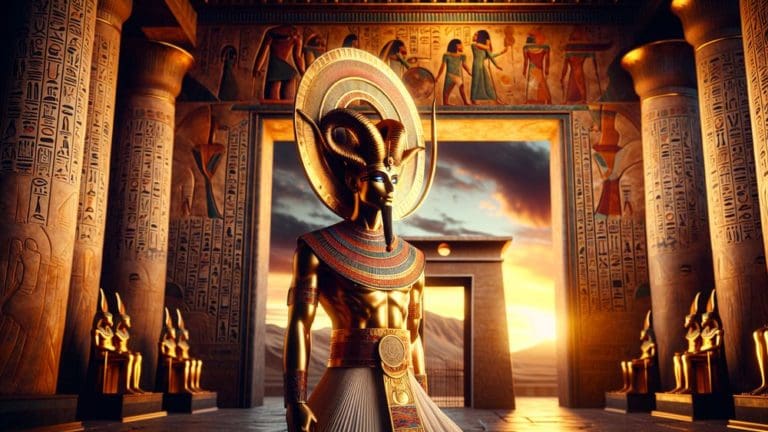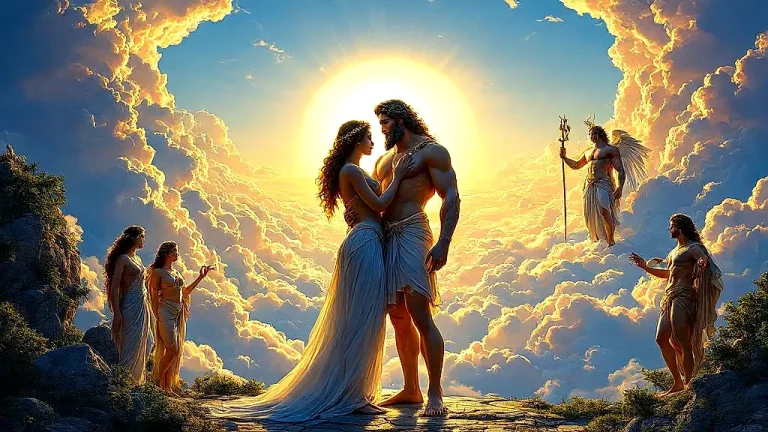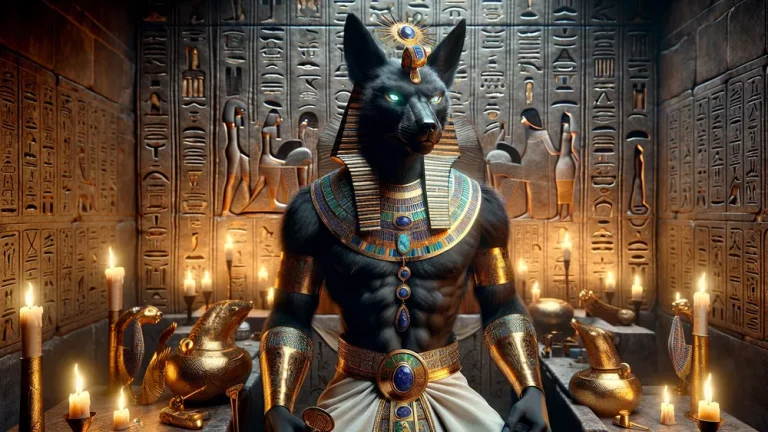Ngai: The Supreme God In African Mythology And Religion
In African mythology, Ngai is the highest god of the Kikuyu and Maasai people. He represents both creation and justice. The Kikuyu call him Mwene Nyaga (Owner of Brightness), while the Maasai know him as Engai (The Unified One). Different groups tell different stories about Ngai. The Kikuyu say he came from the sky to shape Mount Kenya and create humans. The Maasai believe he separated the earth from the heavens.
Key Points:
- Ngai is the top god for the Kikuyu and Maasai, seen as both creator and judge.
- The Kikuyu call him Mwene Nyaga (Owner of Brightness), while the Maasai say Engai (The Unified One).
- He made Mount Kenya his home and shaped the land, also creating the first humans, Gikuyu and Mumbi.
- Ngai controls thunder, rain, and fertility, using them to reward good actions or punish bad ones.
- People worship him through sacrifices, prayers, and ceremonies tied to farming and life changes.
- He talks through dreams to seers or gives signs in nature, like bird flights for the Maasai.
- Unlike other African gods, Ngai acts directly instead of working through helpers or tricksters.
Unlike other gods who stay distant, Ngai gets involved directly. He rewards good behavior with fertile land, but he also punishes disobedience with floods. His dual role as creator and judge reflects common themes in mythology. This introduction explains Ngai’s myths, rituals, and his importance in African cultures. Each story reveals more about the people who worship him.
Ngai: Overview and Key Facts
| Aspect | Details | Variations and Notes |
|---|---|---|
| Names and Titles | Mwene Nyaga (Kikuyu: “Owner of Brightness”), Engai (Maasai: “The Unified One”). | Some Maasai groups say Enkai (female version). |
| Role | Highest creator, judge of right/wrong, and life-giver. | The Kikuyu show Ngai as more involved, while the Maasai see him as more distant. |
| Domains | Sky, thunder, rain, fertility, justice. | Thunder represents his voice. He sends droughts or floods as punishment. |
| Sacred Sites | Mount Kenya (Kikuyu), sacred groves (Maasai). | Kikuyu link Ngai to the mountain’s snowy peak (“Throne of Brightness”). |
| Symbols | Lightning, fig trees (Kikuyu), sacrificial animals (white goats, bulls). | Fig trees (mugumo) connect earth and sky. |
| Worship | People worship through prayers and sacrifices. The Maasai hold age-set ceremonies. The Kikuyu perform rainmaking rituals. | Elders or seers (laibon in Maasai) lead these practices. |
| Moral Code | Requires truthfulness, peace in the community, and careful land use. | Breaking rules (like adultery) may bring curses such as droughts. |
| Comparable Gods | Amun-Ra (Egypt: sun/judge), Olorun (Yoruba: sky god). | Unlike Nyame (Akan), Ngai seldom works through trickster go-betweens. |
Where Ngai Comes From and What He’s Like
To understand Ngai better, we should first look at where he comes from. This means examining the creation stories about him.
Ngai’s Creation Story
The Kikuyu say Ngai first came down from the sky. He picked Mount Kenya (Kĩrĩnyaga, meaning “Mountain of Brightness”) as his home on earth. There he shaped the mountains and valleys. Then he created the first man, Gikuyu, and woman, Mumbi. This shows how Ngai worked directly as a creator, making the land sacred through his actions. However, the Maasai tell a different story.
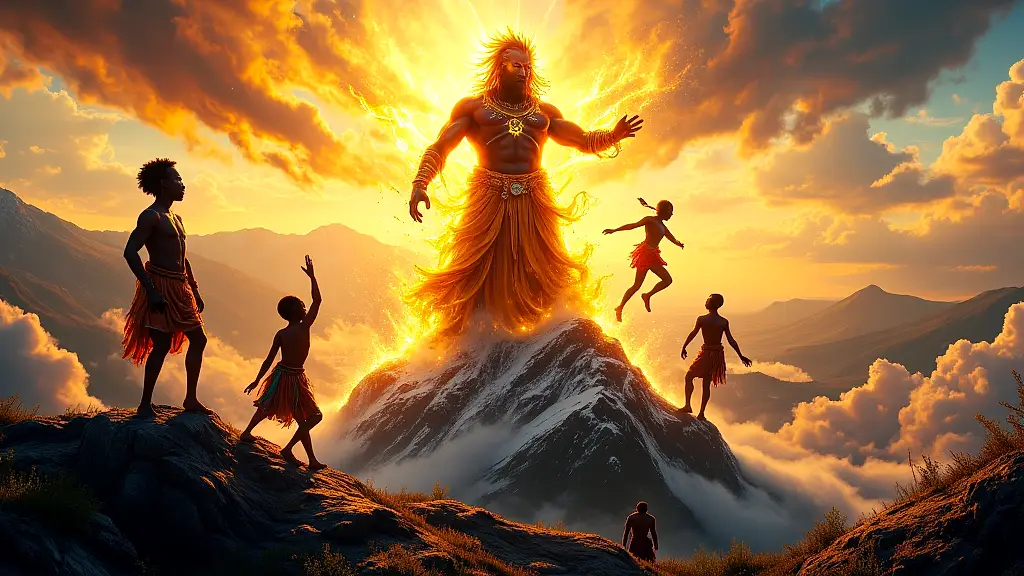
Their tradition says Engai (their name for Ngai) began by separating the universe. He divided the original chaos into sky (enkai) and earth (enkijiji). Unlike the Kikuyu version, the Maasai Ngai keeps balance instead of acting directly in human affairs.
Both groups use special names that describe Ngai’s power:
- Mwene Nyaga (Kikuyu: “Owner of Brightness”): Shows his link to Mount Kenya’s shining peaks
- Engai (Maasai: “The Unified One”): Reveals his role in keeping the universe in harmony
Ngai created the Kikuyu people and their sacred land, while the Maasai believe Engai shaped the universe by separating sky and earth to keep balance.
What Makes Ngai Powerful
Ngai has three main kinds of power. First, he has total control over creation. Second, his thunder shakes the ground as a warning sign. Third, he enforces strict moral rules for people. Ngai both provides for humans and punishes them when needed. His thunder isn’t just powerful – it serves as a reminder when people break moral laws.
To see what makes Ngai special, here’s how he compares to other African supreme gods:
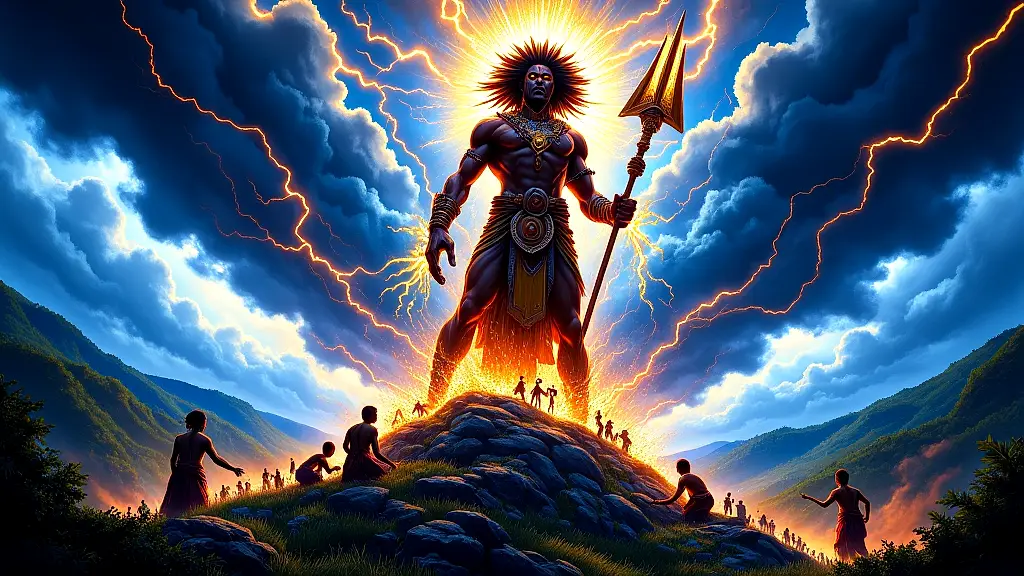
| Deity | Power Level | Connection to Thunder | Moral Role |
|---|---|---|---|
| Ngai (Kikuyu/Maasai) | Created everything | Thunder is his direct voice | Enforces rules through nature’s signs |
| Amun-Ra (Egypt) | Controls the sun’s power | No thunder link | Focuses on the universe rather than people’s behavior |
| Olorun (Yoruba) | Ultimate source of life | Only connects through Shango | Lets other gods handle morality |
| Modjaji (Lovedu) | Controls rain and crops | No thunder power | Keeps peace through rain gifts |
Ngai in African Mythology
Having examined Ngai’s divine qualities, we can next investigate his influence. The stories and traditions show how he affects both people and places.
Ngai and the First People
The Kikuyu say Ngai gave fire to humans through the Mugumo tree, which acted as a link between the sky and land. When lightning hit its branches, Ngai changed the dangerous energy into controlled fire. People learned to use it for warmth, safety and cooking. This story explains both fire’s origin and why the Mugumo tree became sacred, where heavenly gifts turn into earthly benefits.
Ngai also taught farming through stars and weather. The constellations worked as guides, with their movements showing when to plant crops. Certain clouds predicted coming rain. The Pleiades cluster (called “Kîrîma” in Kikuyu) was especially important – its appearance meant time to prepare fields. These cosmic patterns helped shift people from hunting to farming, creating Kikuyu’s agricultural base.
These old stories teach important rules:
- Stewardship of land: People must care for the earth responsibly
- Communal obedience: Following divine rules brings success
- Respect for nature: Natural events contain messages
- Interdependence: Humans need to understand sky patterns to survive
How People Honor Ngai
The Kikuyu connect with Ngai through three main ceremonies tied to farming cycles and life changes. At each rainy season’s start, elders offer white goats at special fig trees. The white color shows they want Ngai’s clean rains. When droughts get bad, they perform blood sacrifices on Mount Kenya, believed to be Ngai’s home on earth.
The red blood serves as both request and apology, similar to how farmers take extra steps during bad harvests.
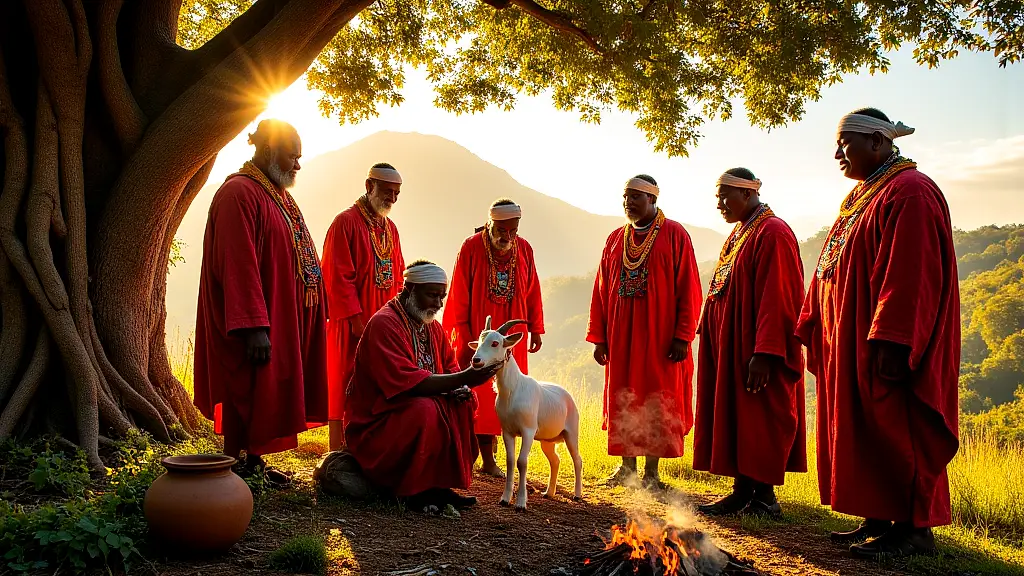
The most important celebrations happen during age-set initiations, marking when young warriors become elders. These multi-day ceremonies include:
- Purification rites: Washing with holy water
- Communal feasting: Eating sacrificed animals together strengthens community
- Oath-taking: Promises to follow Ngai’s rules and group values
- Ancestral invocation: Asking ancestors to speak to Ngai
When Ngai Gets Angry – and When He Blesses
Kikuyu stories tell of a great flood when Ngai sent heavy rains to cleanse the earth of human wrongdoing. This shares similarities with other flood myths but has unique local details. Ngai became angry because people kept resources for themselves, ignored communal obligations, and disrespected holy places. The rising waters served as both punishment and complete renewal.
According to most versions, only a good older man and his family survived by reaching Mount Kenya’s slopes. This story teaches that respecting Ngai and community unity are necessary for survival. In happier times, Ngai rewards people with good land. The stories describe how Kikuyu families who followed traditions and worked together found areas with rich soil and fresh streams.
These productive lands weren’t just gifts but clear signs of Ngai’s favor. Even today, certain hills, rivers and plains show this blessing through their ability to grow crops year after year.
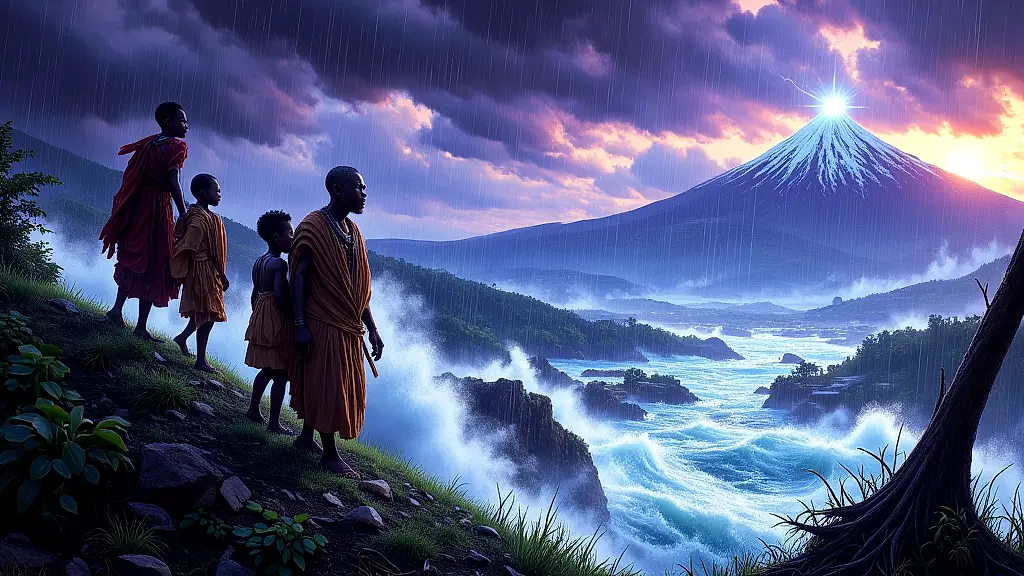
Ngai and Other African Gods
Now that we’ve looked at Ngai’s stories and characteristics, let’s see how he compares to other African gods. This will help us understand where he fits among these different spiritual figures.
Ngai vs. Nyame (Akan God)
These two gods create the world very differently. Nyame works through others, giving tasks to Anansi the spider. Ngai, however, works directly like a craftsman, shaping Mount Kenya himself and creating the first humans personally. Nyame’s creation happens when Anansi carries out orders, sometimes making mistakes or changing them.
Ngai’s world forms through direct divine intervention, making a clear connection between creator and creation that remains important in Kikuyu beliefs. Their approaches to right and wrong also differ greatly. Nyame often accepts Anansi’s tricks and even admires their cleverness, as long as they don’t upset the important balance.
Ngai shows no such tolerance – in the Kikuyu adultery story, he punishes deception immediately and harshly. Where Nyame might accept a clever trick, Ngai acts as a strict judge who doesn’t tolerate human mistakes.
Nyame lets others shape the world while making room for mistakes, but Ngai builds everything himself and punishes wrongdoing without mercy.
How Ngai Talks to Ancestors
The Kikuyu believe Ngai communicates through ancestral spirits to special seers called mundo mugo. These seers receive messages in vivid dreams that need careful understanding. The Maasai have a different system – their laibon (spiritual leaders) read Ngai’s will by watching birds closely. An eagle’s flight might confirm something is right, while seeing a vulture unexpectedly could mean trouble is coming.
While these methods differ between cultures, they both connect people to Ngai through trained interpreters. The Kikuyu rely on dream visions passed through ancestors, whereas the Maasai look for signs in nature. In both cases, certain people learn how to understand these spiritual messages properly. This keeps the important link between humans and the divine world active and clear.
Pantheon of African Gods
Ngai is important in East Africa, but Africa has many different gods across its cultures. These include the Fon’s Mawu-Lisa and the Baganda’s Katonda. If you want to learn more about these deities, we suggest this complete list of all the African Gods. It covers hundreds of gods from different cultures.
Now let’s look at some common questions about where Ngai fits in African mythology.
FAQs
1. Is Ngai worshipped today?
Ngai is worshipped today primarily by the Kikuyu and Maasai people in traditional rituals and ceremonies.
2. How does Ngai differ from the Christian God?
Ngai differs from the Christian God by embodying a dualistic nature (both benevolent and wrathful) tied directly to natural forces like thunder and Mount Kenya, whereas Christianity emphasizes a singular, omnipresent deity detached from geographic specificity.
3. What animals are sacred to Ngai?
Sacred to Ngai are white goats and cattle, often sacrificed in rituals to honor his divine authority.
4. Are there temples dedicated to Ngai?
Temples dedicated to Ngai are not traditionally built, as worship occurs in sacred natural sites like Mount Kenya.

